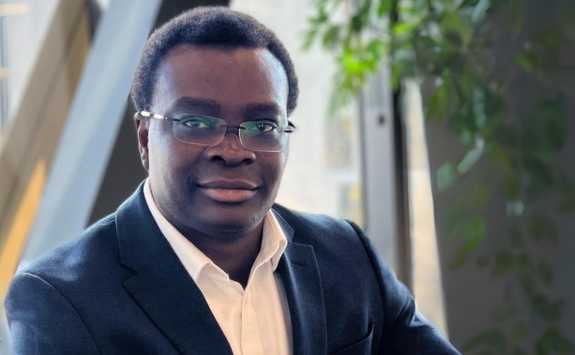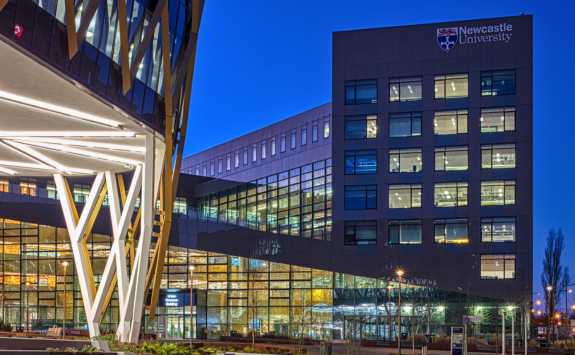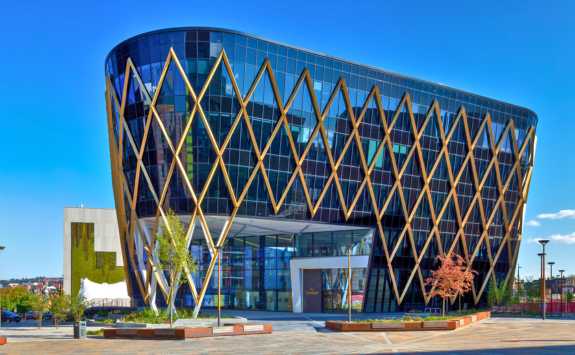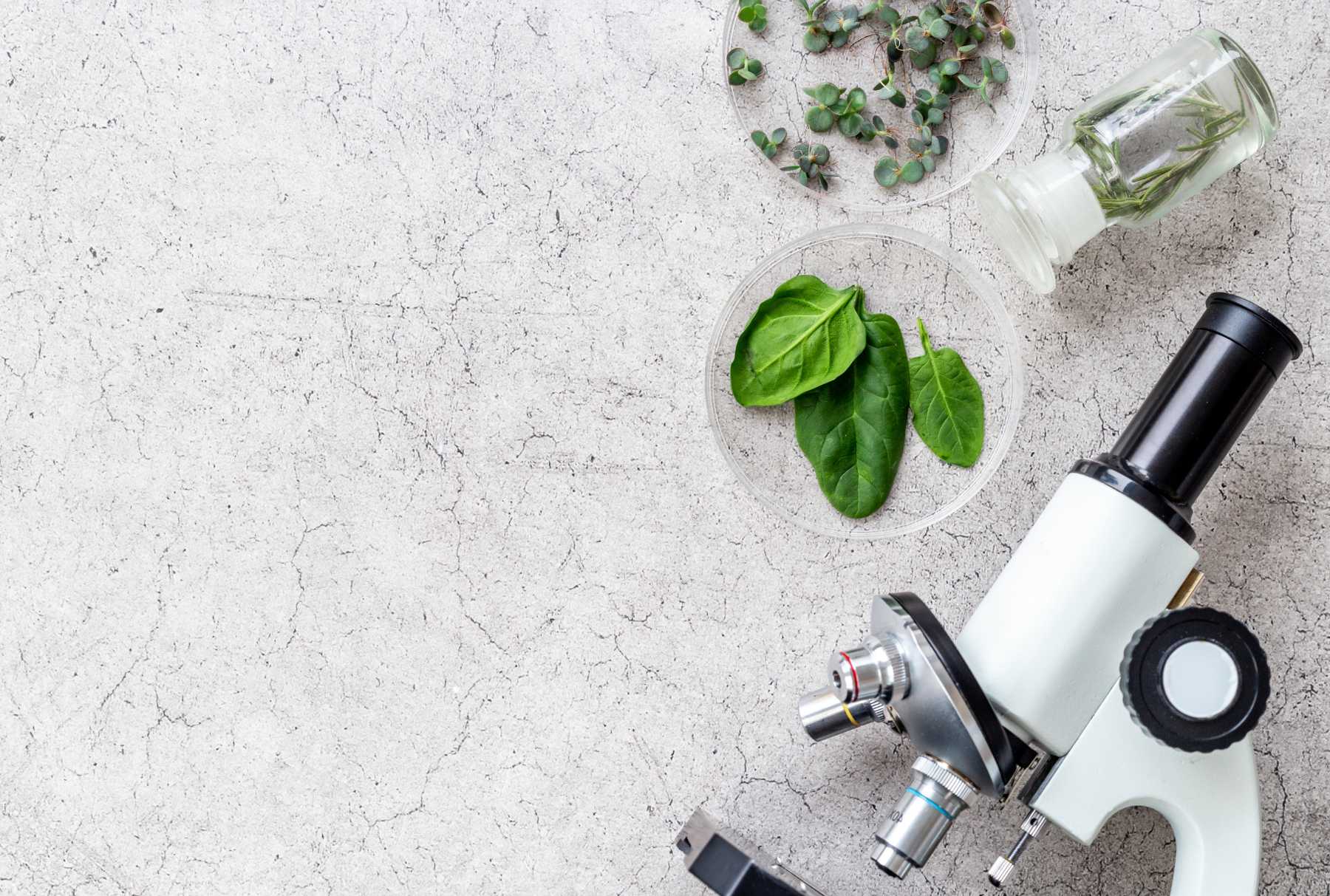Meet our neighbours: HexisLab
Founded by Newcastle University alumnus Dr Olusola Idowu, HexisLab use ground-breaking science and technology to develop products for the cosmetics, personal care and pharmaceutical industries.
12 December 2023
HexisLab was founded by Newcastle University alumnus Dr Olusola (Sola) Idowu. They use ground-breaking science and technology to develop products for the cosmetics, personal care and pharmaceutical industries. HexisLab is based in The Catalyst, a close neighbour of the Business School. It's one of many innovative businesses on the Newcastle Helix site.
Sola graduated from Newcastle University in 2000 with a PhD in Applied Mathematics. He later returned to join the School of Computing as a Research Scientist.
Newcastle University Business School caught up with him to discuss, in his own words:
- the impact of AI
- HexisLab’s sustainability and inclusivity goals for the future
- the benefits of being a Newcastle University alumnus and a resident of Newcastle Helix
HexisLab and AI
"HexisLab started ten years ago this year. We do three things:
- Discovery – understanding what the best formulation is, and what are the best ingredients to use in these formulations.
- Test and validate – we do bespoke assays to analyse ingredients and we write technical reports on the activity of a material.
- Create products – make ingredients or specific end formulations that customers can use and take directly to market.
Many of our clients have got to know us through word of mouth, thanks to our successful use of AI over the last ten years and our work on products that promote inclusivity

"The use of AI has been around for quite a while, but it's never really been known. It has been used in the pharmaceutical industry successfully over the years, and we started on that journey ten years ago – using machine learning models and in-silico prediction tools to analyse formulation. In-silico refers to something that is conducted or produced by means of computer modelling or simulation, in relation to scientific experiments or research. At HexisLab, we started using these to analyse ingredients before testing, to reduce waste, and to improve successful outcomes for testing and validation. Many of our clients have got to know us because of this; we don’t really do any marketing. We have clients from all over the world and they contact us to look at their product formulation. Sometimes they want to do reformulation, sometimes they’re looking for new materials to be used in their existing products.
"Companies also choose to come to us because of our work on testing products that promote inclusivity. A recent McKinsey report indicated that 99% of the products that are tested in the beauty and personal care industry are tested on European or Asian skin and hair types. This leaves a gap in the industry for the rest of the world. We've done quite a lot of work and published a number of papers on this, where we've tried to understand the response of different materials and ingredients on different skin types. In our labs, we do a lot of testing to make sure that the materials are effective and safe before they go to clinical and user testing. We have found that some natural materials work positively for some skin types but negatively for others. Just because it’s natural, doesn’t mean that it’s safe – it needs to go through laboratory testing. We have the in-silico team and the lab testing team working in the same space and learning from each other. What we learn from experiments, we fit into the models. What we learn from the models, we validate in an experiment."
We started working with AI ten years ago, but it’s great to see recent developments and how it can help the everyday consumer.
"As I mentioned, the use of in-silico machine learning technologies has been around quietly over the years. The new large language models that exist now are giving people a better understanding of how AI can be used. It can accelerate product development, reduce cost, reduce waste, and improve sustainability. There are no more excuses for using bad materials or inefficiency as we know, and the consumer knows, that there are better ways of doing things. It is forcing the industry to think differently.
"I've been talking to some of our clients for years about using these kinds of tools, and suddenly, they are coming to us and saying, remember that thing which you spoke about five years ago, can we talk about it again? There’s been a lot of momentum and a lot of interest, which is fantastic.
"It’s good for the consumer, good for the planet, and it also gives us as an SME the opportunity to contend with the big companies, as we have the tools that they wish they had internally. We can work quicker and smarter, and we can create real-world solutions. This is why businesses contact us a lot of the time – they see the papers that we have written and are interested by them and want to know how we do it. We’ve had some very big names come to visit us in Newcastle."

Sustainability
"Sustainability is very important to us because we've got one planet and it's home for all of us. We’ve got to make it happen. Over the years, many of the ingredients that are used in product development for beauty and personal care have been known to not be very effective, and some of them are not very sustainable or safe either. There has not been any reason to make changes or to do anything differently for a long time. But with Generation Z driving the agenda of the planet, and with the advent of AI saying that there are better, more efficient, faster, and easier way of doing things, the big players in the industry are being forced to think differently. They must find sustainable alternatives to some of the ingredients they use.
"Some of the grants that we were awarded recently is particularly focused on that need for sustainability.
"There are some phenomenally good materials in nature that we can use for skincare, but we would have to cut down an awful lot of trees to do that, destroy forests even. To get an active ingredient, which is in 1% of the leaf that is being used, there are no easy routes to do that from synthetic chemistry, because synthetic chemistry itself for any particular compound may create more harmful chemicals and more waste that are even more damaging to the environment. So, the other option is just to say, well why don't we produce this in the lab using a fermentation process? And that is what the grant is about.
"We can produce some of these amazing chemicals that do great things for the skin and hair, and we can produce them effectively in a way that we don't have to cut down the trees or worry about synthetic chemistry. This means that we can now have the fantastic product that the consumer is looking for at very little or no cost to the environment. That is the goal of the net zero grant – we can learn how to produce these sustainable materials in large quantities."
Influencing the industry
"There are so many areas for leadership. One is formulating with less ingredients. I have a joke with a friend who is a professor of chemistry that we want to challenge ourselves and see whether we can create a shampoo with only four compounds, and whether that is possible or not. But that is a goal – why not? For us, we think there are only four major things that you need for this, but how do you create those four things in a way that is sustainable as well? That would be a future goal. We want to see if we can reduce waste, rethink product development, and use AI and machine learning to reduce the amount of time wasted in the lab.
Influencing the industry to do things the right way is one of the other main goals for HexisLab.
"We want to change this, and we also want to influence the industry and drive the agenda for inclusivity. We want the ethnic minorities in the West and also in other parts of the world to have products that work for them and that they can be proud of. Not just copying the same brand that has been successful in the West and relocating it to other parts of the world – people just take this as the only option they’ve got. We have partners in India and China that we want to work with to see how we can create solutions that are bespoke to different ethnicities and it’s a fantastic way of supporting their needs.
"Those are the drivers and it's in line with the Generation Z way of thinking. We want to do things differently, we want to be sustainable and environmentally friendly, and we want to think about how to create new solutions. So that is our future goal – to see how we can become more inclusive, how we can become more sustainable, how we can be more efficient in product development and reduce waste, and also reduce the cost of buying products, which sometimes feels unreasonable for consumers. That's the way to look at it."
Connected to Newcastle University
"My time in Newcastle was some of the best years of my life, and I still feel connected to the University.
"I did my doctorate in Mathematics in Newcastle and I graduated in 2000. It was great. I enjoyed the research and I made great friends. I have really fond memories and I am still connected with the academics and the professors. I did my postdoc in the US, and then returned to Newcastle University to join the School of Computing, where we spun out the company e-Therapeutics plc. I was one of the founding members in 2003, I led the discovery team and, even at this time, we were talking about using computer models to predict activity of compounds and we got lucky. We still had successful results regardless of the lack of understanding. e-Therapeutics was a success, and these experiences were invaluable. In this way, I feel like I’ve never graduated, I feel like I’m still on the campus.
"With the Urban Sciences Building next door to where we’re based on Newcastle Helix, it’s still the same contacts and still the same professors that I have worked with over the years. It’s great to continue the conversation and to discuss ideas and collaborate."


"We’ve had lots of students participate in internships with us over the years and they often tell me it’s one of the best experiences they’ve had at university. Many of them have gone on to PhD programmes and they’ve done really well. It’s great to have student involvement as they challenge you, they come up with new ideas that we would never think about. We did some work with the Business School last year and it was an eyeopener – it was impressive to see the talent of the students. They come from a different perspective which is great to have, and it’s fantastic for the lab to have this influx of ideas."
Part of the Helix ecosystem
"Being amongst all the innovative businesses as part of Newcastle Helix has benefitted HexisLab. It’s a great ecosystem to be a part of. For the students, we’re located very close to both the Business School and the School of Computing, and this is a great opportunity for them also.
"Current students and recent graduates need to think differently. I think that the workplace is going to change drastically in the next five to ten years, and nobody really knows how it’s going to shape out.
"We are still unsure about exactly what impact AI has had, and we are still trying to see how it is going to change the way we work, the way we think, and the way we live. If I was a current student, I would be open to learning across disciplines as much as possible. At HexisLab we have had to readapt lots of times, and we were able to do that because, as a team, we have all crossed disciplines throughout our careers and it allowed us to find solutions to our problems. I would advise current students to learn as much as possible, to be able to have a wide breadth of knowledge that can be used to shape the future.
"I enjoy being a part of the Helix site and still having connections with the University. The relationships are fantastic, and being able to change the world and make a difference right here from the heart of Newcastle is great. I would say the same for the rest of my team too, everybody believes in what they do and they want to make a difference, and they’re working hard to do so. It’s a very exciting time."
